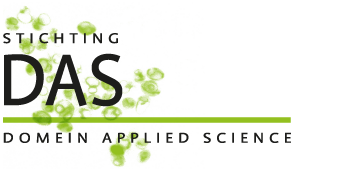The Biotechnology programme trains students for the role of analyst in a professional field which is strongly focused on product development. The emphasis is on the link between knowledge of living organisms and technical applications for making products that people can use.
The professional field for biotechnology analysts can be divided into green, red and white biotechnology. In all these areas, the emphasis is on the link between knowledge of living organisms and technical applications. In green biotechnology, this knowledge is applied to issues arising from agriculture and horticulture. Red biotechnology is concerned with medical issues and white biotechnology is concerned with applications for industrial or laboratory analysis. A biotechnology analyst will have shown a clear preference for one of these colours during his course of study.
In a research and development environment, the BSc is involved in developing new products, organisms (including micro-organisms and plants), materials, methods and processes or improving existing ones. The BSc operates individually within a research team and is often responsible for a separate piece of research. In research, production,
quality control or diagnostics, the BSc conducts complex experiments that challenge his practical skills and analytical ability and helps to find the answers to diverse questions. This can happen in laboratories in various areas, ranging from the food industry to laboratories dealing with forensic and agricultural questions. The great diversity of analyses, ranging from manual to fully automated and robotised analyses, requires the effective deployment of technologies, equipment, IT and quality assurance. The BSc can also be involved in or primarily responsible for managing and
controlling some or all of a research or production process. Working as part of a team, he develops or applies new technologies or processes or improves existing processes, organisms, products or materials. All aspects of sustainability are always taken into account.
National Educational Programme

Body of Knowledge and Skills
Knowledge
- Cell biology: structure and function of eukaryotic and prokaryotic cells, metabolism, transport
- Chemistry: basic chemistry (atomic structure, reactions in water, kinetics), analytical chemistry (spectroscopy, chromatography), organic chemistry and synthesis
- Biochemistry: biomolecules, protein and enzyme chemistry
- Molecular biology: DNA, heredity, molecular genetics, recombinant DNA techniques
- Mathematics: chemical arithmetic, functions (differentiating, integrating)
- Genetics: basic concepts and application (e.g. population genetics, QTL analysis)
- Statistics: data processing, normal distribution, confidence intervals, testing
- Bioinformatics: sequence analysis, annotation of genomes, transcriptome analysis, Bioinformatics Web Services (e.g. EBI, NCBI)
- Botany: basic knowledge (evolution, anatomy, photosynthesis, genetics); optional subjects: domestication, resistance, breeding (including at molecular level), hormones, components
- Immunology: innate and acquired immunity; optional subjects: autoimmune diseases, immunodeficiency diseases, immunology and cancer, immunology techniques
- Pathology: anatomy, physiology and pathology of organ systems
- Microbiology: taxonomy, determining and quantifying micro-organisms
- Sustainability
Skills
- General laboratory skills based on GLP rules: weighing, pipetting, making solutions (buffers, culture media) and preparations, colourings, microscopy, lab journal, reporting, chemical arithmetic
- Safe working in the laboratory, working in accordance with GMT rules (good microbiological techniques): working in aseptic and sterile conditions, culturing micro-organisms and eukaryotic cells, using special media, biological materials (tissues and cells from plants and animals, blood, urine, etc.) and biomolecules (proteins and/or antibodies, DNA); waste processing
- Using standard laboratory equipment: pH meter, spectrophotometer, centrifuge, power sources, electrophoretic equipment, fume cupboard, safety cabinet, microscope
- Molecular biology techniques: DNA/RNA isolation, digestion, ligation, transformation, PCR, qPCR, gel electrophoresis; column chromatography; flow cytometry; HPLC and FPLC
- Chemical analysis methods: spectrometry, chromatography, enzyme analysis, bonding analysis
- (Bio)chemical procedures: fractionation methods, SDS-PAGE, preparative chromatography, western blotting, ELISA, fluorescence microscopy, flow cytometry
- Computer skills: word processing, spreadsheets, slide presentations, bio-informatics tools, simple imaging
- Social and communication skills: collaborating, meetings, reporting (lab journal, research report), oral presentation, project-based work, ethics
- Research skills: problem analysis, research questions, desk research, research planning and implementation
The Body of Knowledge and Skills is a summary of graduates’ basic knowledge and basic skills which has been prepared by the HBO-programmes in consultation with the professional field. These are obtained during the first two years of education.
Institutions and professional fields
Institutions offering the programme keyboard_arrow_down
- Inholland University of Applied Sciences, Amsterdam
- NHL Stenden/VHL, Leeuwarden
Illustration of professional field keyboard_arrow_down
Occupations, jobs and roles for graduates are mostly to be found in the following professional domains. A few examples are given for each domain.
Research and development
- Researcher
- Forensic laboratory worker
- Vaccine developer
- Plant breeder
Commerce and customer service
- Advisor with consultancy or research firm
- Advisor with safety or environmental consultancy
Application and production in laboratories
- Quality control in food industry or horticulture
- Production of medicines or ingredients
Engineering and manufacturing
- Bio-process engineer
- Production manager
- Reactor designer
The Body of Knowledge and Skills is a summary of graduates’ basic knowledge and basic skills which has been prepared by the HBO-programmes in consultation with the professional field. These are obtained during the first two years of education.
Typical course books keyboard_arrow_down
- Campbell Biology, L.A. Urry, M.L. Cain e.a.
- Biotechnologie for beginners, R. Renneberg, V. Berkling e.a.
- Plant Biology, A.M. Smith, G. Coupland e.a.
- Essential Cell Biology, B. Alberts, K. Hopkin e.a.
- Biochemistry, J.M. Berg, J.L. Tymoczko e.a.
- Bioprocess Engineering Principles, P. M. Doran
- Introduction to Genetic Analysis, A. Griffiths, J. Doebley e.a.
- Molecular diagnostics: Fundamentals, Methods and Clinical Applications, L. Buckingham
- Practical Skills in Forensic Science, A. Langford, J. Dean e.a.
- Statistiek, validatie en meetonzekerheid voor het laboratorium, J.W.A. Klaessens
The list of typical textbooks serves as an illustration to give an impression of the level at which the subject is taught in the study programme.
